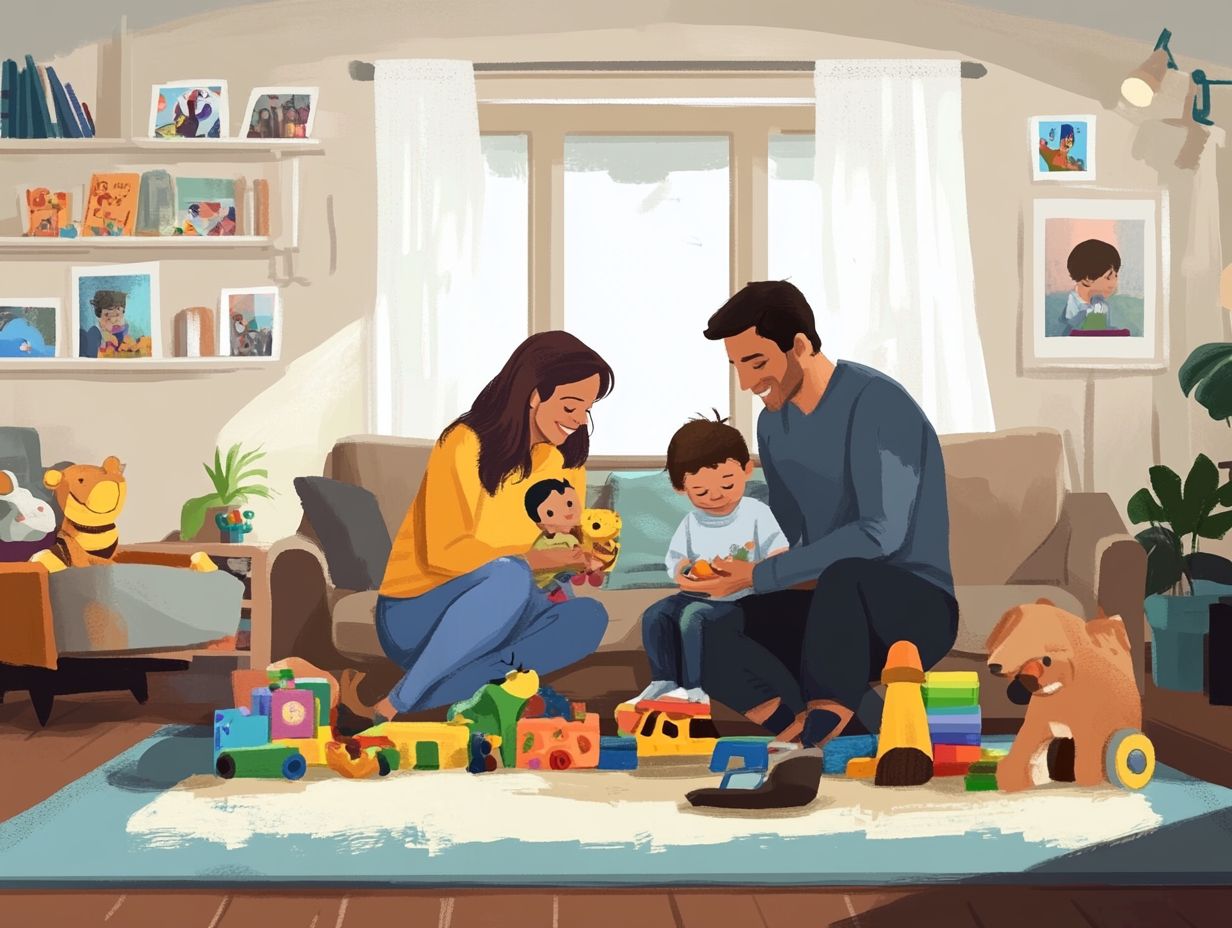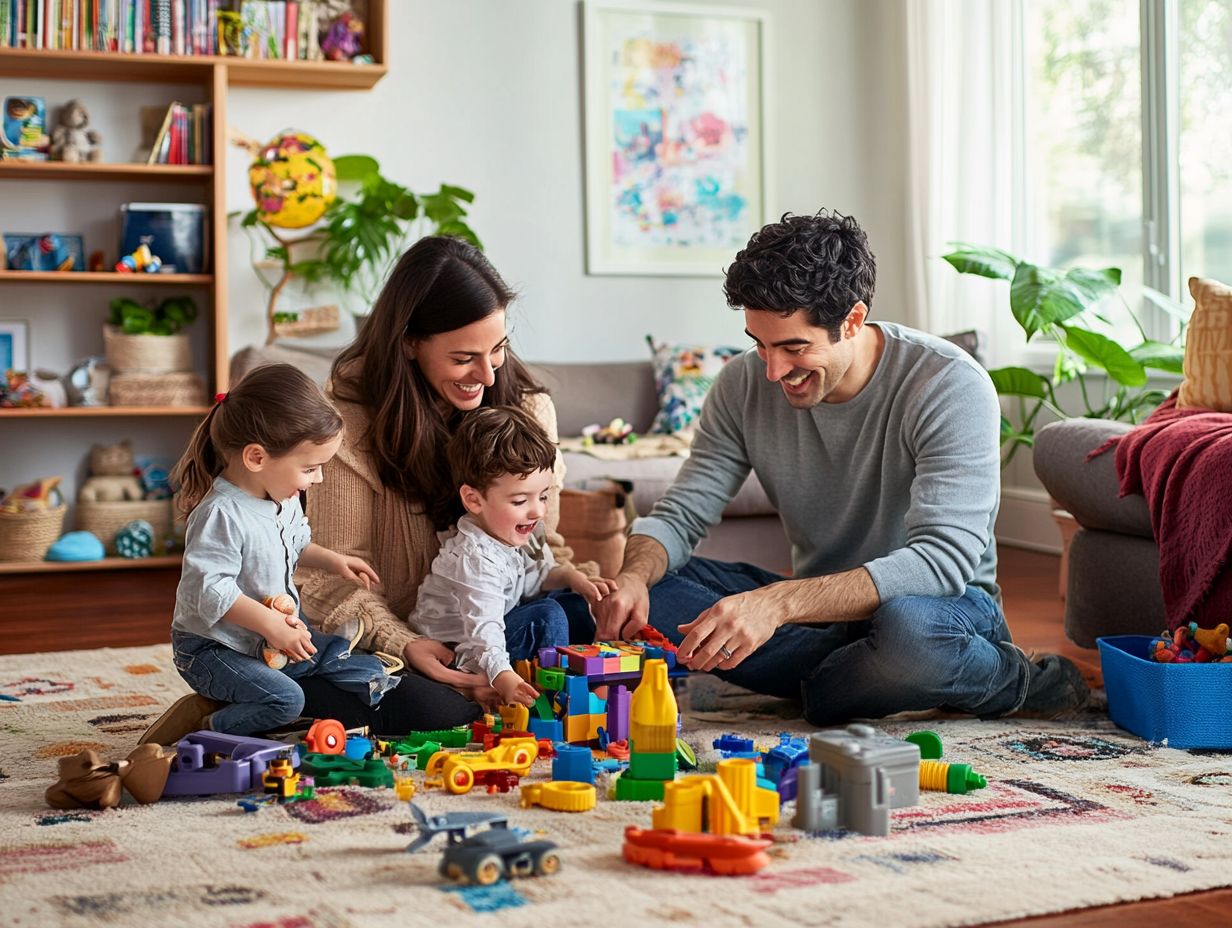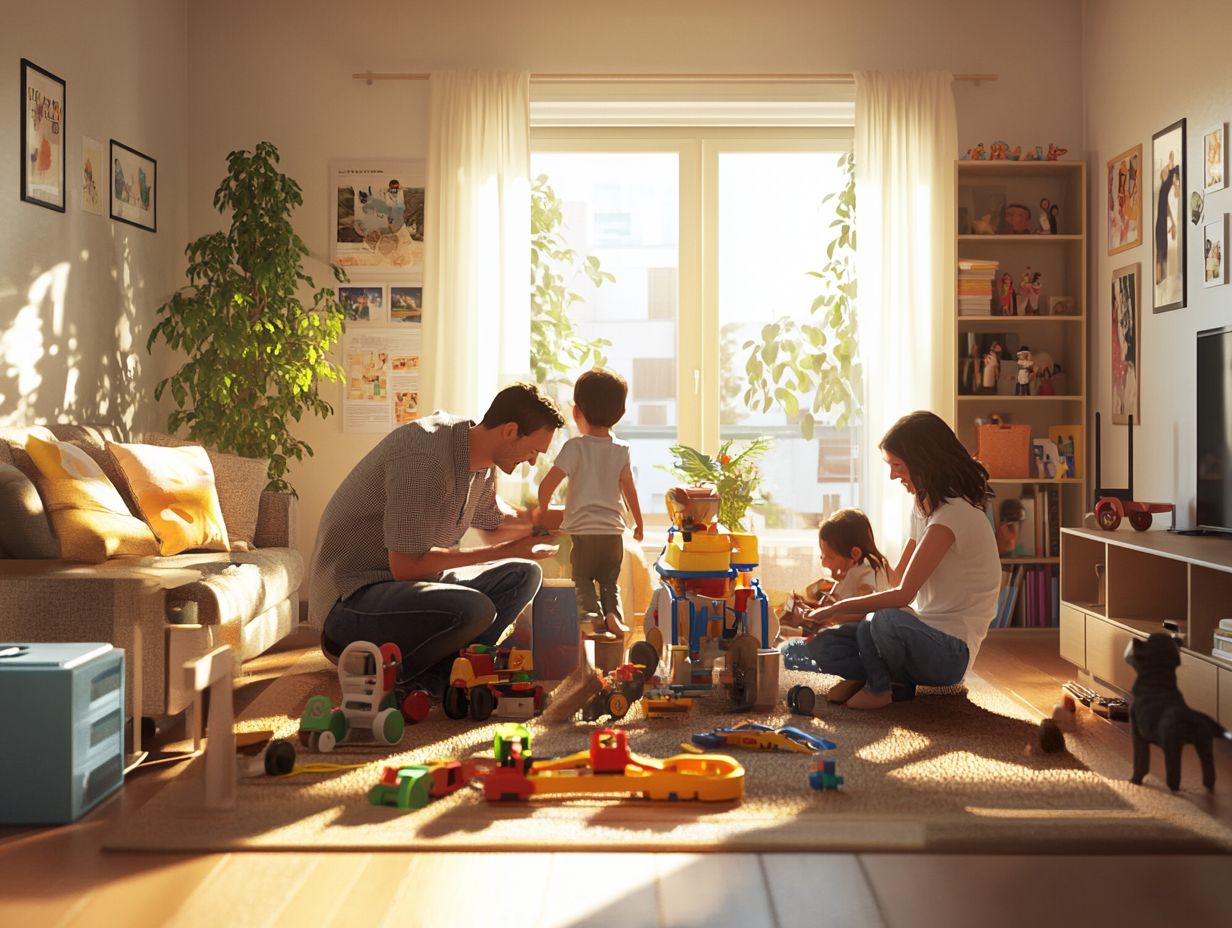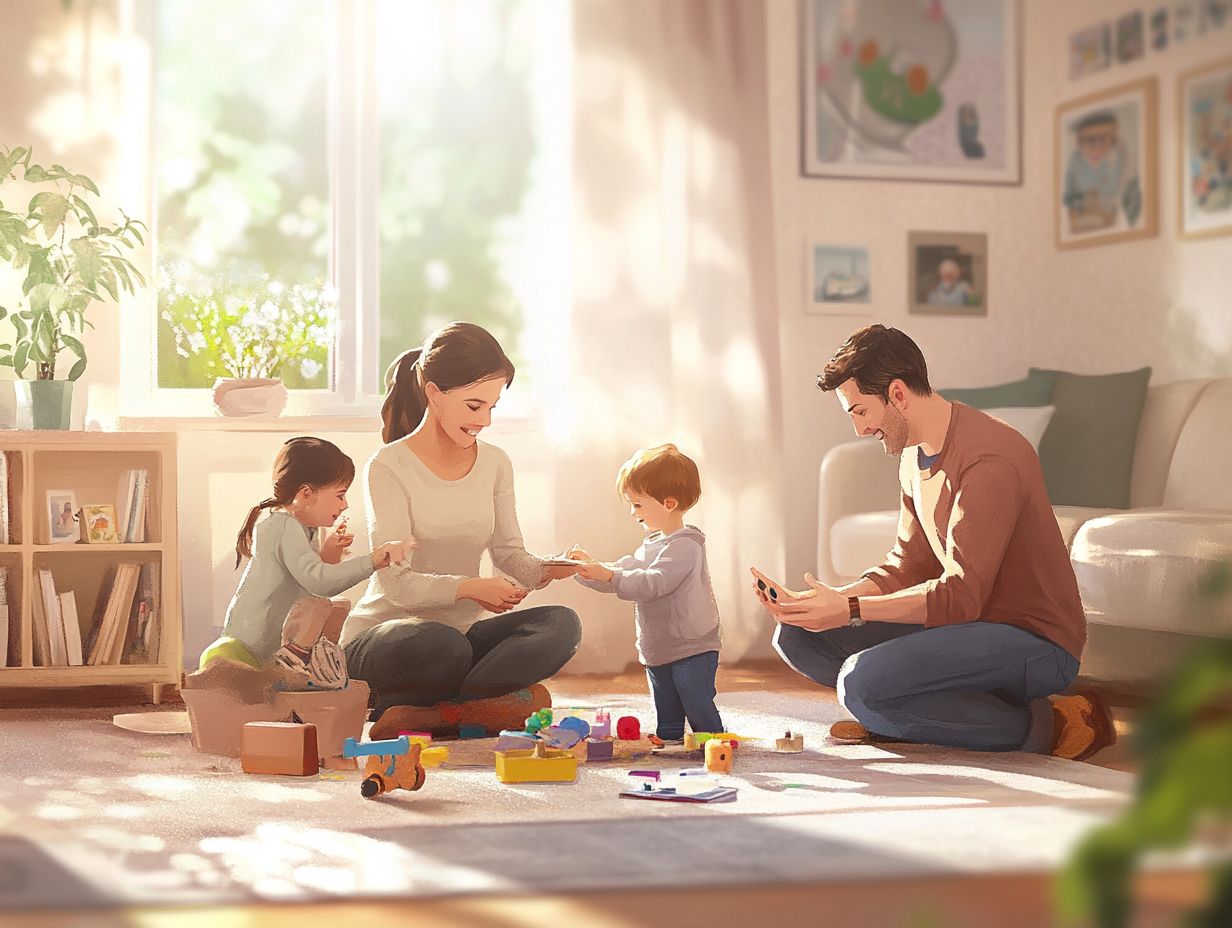The Influence of Family Environment on Kids
Contents
- The Importance of Family Environment in Child Development
- Key Takeaways:
- What Is Family Environment?
- What Are The Components Of Family Environment?
- How Does Family Environment Affect Kids?
- What Are The Negative Effects Of A Dysfunctional Family Environment?
- 1. Poor Mental Health
- 2. Behavioral Issues
- 3. Academic Struggles
- 4. Difficulty Forming Relationships
- How Can Parents Create A Positive Family Environment?
- Frequently Asked Questions
- What is the definition of family environment?
- How does family environment affect kids?
- What are some examples of a positive family environment?
- What are some ways to improve the family environment for kids?
- How does family environment affect a child’s mental health?
- What can parents do to create a positive family environment for their kids?
The Importance of Family Environment in Child Development
The family environment holds immense significance in shaping a child’s development and overall well-being. It consists of various components both physical and emotional and even aspects like education that together create a distinct atmosphere at home.
Recognizing these elements is vital, as they profoundly influence a child’s emotional, social, cognitive, and behavioral growth.
Join us as we explore the fascinating world of family environments and how they can transform a child s life!
This article delves into the intricacies of family environments, the adverse effects of dysfunction, and actionable strategies for parents and caregivers to cultivate a nurturing atmosphere.
Key Takeaways:

- Family environment plays a crucial role in a child’s emotional, social, cognitive, and behavioral development.
- A dysfunctional family environment can negatively affect a child’s mental health, behavior, academic performance, and ability to form relationships.
- Creating a positive family environment involves effective communication, setting boundaries, showing love and support, and providing a stable and safe home for children, including fostering physical development and language skills.
What Is Family Environment?
The family environment plays a pivotal role in child development, encompassing the emotional, social, and physical contexts in which children grow up. It profoundly impacts a child’s emotional security, social skills, cognitive development, and overall developmental outcomes.
Cultivating a nurturing family environment fosters strong parent-child interactions. This builds trust between caregivers and children, promoting healthy emotional and cognitive growth.
By understanding the dynamics of the family environment, you can better assess how various parenting styles influence children’s relationships and their ability to flourish in different settings, ultimately shaping their future academic success and self-esteem.
What Are The Components Of Family Environment?
Understanding the components of the family environment is crucial for grasping how they shape child development and influence various skills, including social, emotional, and cognitive abilities.
You can think of the family environment as comprising three main components: the physical environment, which covers the safety and health aspects of the home; the emotional environment, which reflects the intelligence and skills caregivers provide; and the social environment, which involves the quality of children s relationships with peers and family members.
Each of these components plays a vital role in determining the developmental outcomes for children, highlighting the intricate tapestry of influences that contribute to their growth and well-being.
1. Physical Environment
The physical environment encompasses the tangible elements of a child’s surroundings, including safety, health, and access to resources within both the home and neighborhood. These factors can profoundly influence their physical development and overall growth.
A nurturing atmosphere, characterized by well-maintained homes and accessible outdoor play areas, fosters not only physical growth but also the acquisition of essential motor skills.
When children have the opportunity to explore parks or safe playgrounds, they engage in activities that enhance their coordination, strength, and agility. Such experiences contribute to their emotional security, enabling them to form social connections and build resilience.
Ensuring that children inhabit a secure and stimulating environment is crucial in shaping their overall well-being and nurturing a lifelong passion for physical activity. Ultimately, the quality of their surroundings plays a pivotal role in their holistic growth and development.
2. Emotional Environment
The emotional environment you create as a parent or caregiver plays a pivotal role in shaping your child’s emotional security and development.
This includes their emotional skills and language skills.
When children are nurtured in a responsive setting, they are more likely to develop strong emotional intelligence.
This is essential for their overall well-being.
Attachment theory explains how a close bond with caregivers helps children develop healthy relationships and positive self-esteem as they navigate life’s challenges.
Your parenting style whether authoritative, permissive, or uninvolved directly influences your child’s ability to recognize and manage their emotions.
By fostering a supportive relationship, you encourage open communication and trust.
This allows your child to express their feelings without the fear of judgment.
In turn, this nurtures resilience, empathy, and social skills in their interactions with others.
3. Social Environment
The social environment encompasses the interactions and relationships you cultivate with family members and peers.
It plays a vital role in the development of your social skills and understanding of social dynamics.
Quality relationships within this space significantly influence how you navigate your feelings and perceptions of the world around you.
When you engage meaningfully with friends and family, you absorb valuable lessons about communication, empathy, and trust.
These interactions lay the groundwork for your ability to forge connections later in life.
The trust built through positive family dynamics enables you to express yourself freely, fostering emotional resilience.
Your relationships with peers also teach you crucial skills in cooperation, conflict resolution, and the appreciation of diverse perspectives.
These are cornerstones of holistic emotional development.
Ultimately, nurturing these connections is essential for ensuring you feel secure and valued.
How Does Family Environment Affect Kids?
The family environment profoundly influences children in myriad ways.
It shapes their emotional, cognitive, social, and behavioral development.
A nurturing family setting fosters emotional security, cultivates social skills, and encourages healthy cognitive growth.
This results in positive developmental outcomes for children.
On the flip side, a negative family atmosphere can impede a child’s ability to form trusting relationships.
It can also hinder their ability to acquire the essential skills necessary for academic success and emotional intelligence.
It’s crucial to recognize these impacts now to foster a better future for our children!
Implementing early intervention strategies and enhancing parental involvement is vital in creating a supportive home environment.
1. Emotional Development

Emotional development is profoundly shaped by your family environment.
Your caregivers’ emotional intelligence and responsiveness play a crucial role in molding your emotional skills and understanding of feelings.
When you observe your caregivers expressing emotions, resolving conflicts, and managing stress, you naturally absorb these behaviors and cues.
This helps you navigate your own emotional landscape.
This ongoing interaction fosters a sense of emotional security.
It allows you to feel safe in expressing your own feelings.
These observations also contribute to the development of your emotional intelligence and attachment to caregivers.
For example, when your caregivers validate your emotions and offer appropriate guidance on how to handle them, it strengthens your ability to cope with future emotional challenges.
Ultimately, a nurturing emotional environment equips you with essential tools for self-regulation, empathy, and resilience.
These traits are vital for thriving in various social settings throughout your life.
2. Social Development
Social development flourishes within the family s social environment, where your interactions with parents and peers significantly shape your social skills and ability to build relationships.
In this nurturing space, you absorb essential lessons about empathy, cooperation, and effective communication. Positive engagement with your family fosters a sense of security and confidence, enabling you to explore friendships beyond the home.
Likewise, your relationships with peers reinforce these vital skills, allowing you to navigate complex social landscapes and learn the art of conflict resolution.
The dynamic interplay between family interactions and friendships weaves a rich tapestry of experiences, equipping you to engage harmoniously and cultivate healthy connections throughout your life.
Ultimately, these formative interactions lay the groundwork for successful relationships across various spheres, including academic, social, and professional settings. They contribute to overall academic achievement and social competence.
3. Cognitive Development
Cognitive development is deeply intertwined with your family environment, where your involvement and the mental engagement you provide can significantly enhance your child’s learning abilities and critical thinking skills.
Research indicates that a nurturing and enriched home environment plays a pivotal role in shaping your child s intellectual growth. Engaging in activities that foster curiosity and exploration like reading together, discussing ideas, and offering diverse learning experiences can help your children cultivate strong cognitive abilities, language skills, and academic achievement.
Implementing early intervention strategies, such as introducing educational games or establishing a routine that prioritizes learning, can profoundly impact academic success. By crafting a stimulating atmosphere that encourages dialogue and inquiry, you set the stage for your children to thrive in school and beyond, ultimately contributing to a lifelong passion for learning.
4. Behavioral Development
Behavioral development is profoundly shaped by your family environment, where your parenting style and the emotional security you provide play crucial roles in molding your child’s behavior and reactions.
The dynamics within your home can significantly influence how your children engage with the world around them. For example, adopting a balanced parenting style, which blends warmth with structure, often results in children who display higher self-esteem and enhanced social skills.
Overly permissive or authoritarian approaches can lead to confusion or fear, stunting emotional growth. Creating a nurturing family atmosphere that promotes open communication and trust building fosters a sense of security in your children, enabling them to explore and take healthy risks.
Ultimately, the love and support you offer as a caregiver form the groundwork for resilience, equipping your children with positive coping mechanisms to navigate life’s challenges.
What Are The Negative Effects Of A Dysfunctional Family Environment?
A dysfunctional family environment can profoundly impact children, manifesting in various challenges such as poor mental health, behavioral issues, academic struggles, and difficulties in establishing healthy relationships. These adverse outcomes often stem from a lack of emotional security, insufficient parental involvement, and ineffective parenting styles, creating an atmosphere that hinders a child’s development.
It’s vital to recognize how deeply a dysfunctional family can impact children. Grasping these consequences is crucial for appreciating the vital role a supportive family environment plays in nurturing healthy child development and overall well-being.
1. Poor Mental Health
Growing up in a dysfunctional family a family that struggles to provide emotional support can take a serious toll on mental health. It leaves you without the emotional security needed for healthy psychological development, especially during the early stages of life when infants and young children are highly impressionable.
In these environments, the lack of nurturing relationships often breeds feelings of abandonment and neglect. These feelings can easily evolve into anxiety, depression, or behavioral issues.
If you were raised in such toxic surroundings, trusting others and forming meaningful connections might feel like an uphill battle. This struggle can further hinder your ability to communicate and express your feelings constructively.
The significance of consistent love and support cannot be overstated; without it, you might find it challenging to cultivate resilience, self-esteem, and the coping mechanisms essential for navigating life’s myriad challenges.
Creating a nurturing environment isn t just important it s essential for your emotional health and preventing long-term psychological consequences. Act now to build a nurturing home; it can transform your child s future!
2. Behavioral Issues
Children raised in dysfunctional families frequently exhibit behavioral issues rooted in inconsistent parenting styles and a lack of emotional support.
The chaotic atmosphere often found in these households can severely impede a child’s emotional and social development. When parents do not provide consistent boundaries and nurturing care, it leads to confusion and insecurity in the child.
These emotions can then manifest as aggression, anxiety, or withdrawal, complicating their ability to forge healthy relationships beyond the home.
Children who experience positive parenting often cultivate resilience and effective coping mechanisms. By creating a nurturing and structured environment, caregivers can significantly influence a child’s journey toward appropriate behaviors and emotional well-being.
3. Academic Struggles

Academic struggles often find their roots in a dysfunctional family, where the lack of emotional support and consistent encouragement can stifle a child s motivation and ability to learn.
When you don t receive the backing you need from your family, it s easy to feel isolated and disengaged from your studies. Emotional encouragement is essential in your development; without it, you might lack the confidence to confront challenges or explore your academic interests.
Parental involvement whether it s assisting with homework or attending school events plays a pivotal role in reinforcing your sense of belonging and purpose in an educational setting.
These elements combined can lead to decreased academic performance, leaving you with long-lasting repercussions on your future aspirations and self-esteem.
4. Difficulty Forming Relationships
Difficulties in forming healthy relationships often stem from the instability of a dysfunctional family, where you may find it challenging to establish trust and develop essential social skills.
This instability creates an emotional landscape filled with anxiety, making social interactions feel like navigating a minefield.
Growing up in such an atmosphere, you might not receive the nurturing support that builds confidence and resilience. As a result, you could grapple with insecurities and a fear of intimacy in your future relationships.
When emotional security is absent during your formative years, you may struggle with effective communication or misinterpret social cues, leading to misunderstandings and feelings of isolation.
Recognizing this connection emphasizes the vital role of emotional health in forging meaningful relationships with others.
How Can Parents Create A Positive Family Environment?
Creating a positive family environment demands your intentional efforts as a parent. It involves fostering effective communication, setting clear boundaries, expressing love and support, and ensuring a safe home for everyone. These elements are essential for promoting emotional security and nurturing healthy relationships among family members, whether it s with caring caregivers or involved grandparents.
A nurturing environment doesn t just boost child development; it also enables you to be actively engaged in your children’s growth. By prioritizing these aspects, you can profoundly influence your children’s emotional, cognitive, and social development, laying a strong foundation for their lifelong well-being. For children with hearing impairments, introducing cochlear implants can significantly enhance their communication abilities and overall development.
1. Effective Communication
Effective communication within your family is vital for building trust and enhancing your child’s development. It enables them to express their thoughts and feelings freely.
This open line of dialogue fosters emotional security and guides your children as they navigate their social environments.
When they feel safe communicating with you, they re more likely to develop confidence in sharing their opinions with both peers and adults, including supportive figures like grandparents. Such interactions cultivate a sense of belonging and acceptance, significantly shaping their emotional intelligence.
- Regular conversations at home equip your children with valuable skills like empathy.
- Active listening is developed through practice.
- Problem-solving skills are enhanced by discussing challenges together.
2. Setting Boundaries
Setting boundaries is an essential element in family dynamics. It helps you, as a parent, establish expectations and encourage positive behavior in your children.
Clear and consistent boundaries provide a sense of security, allowing your children to navigate their world with confidence. The parenting styles you adopt play a pivotal role in defining and upholding these boundaries. For example, if you embrace an authoritative approach, you are likely to enforce rules while promoting open communication, creating an atmosphere of respect and understanding.
Conversely, if you lean toward a permissive style, the lines may become blurred, causing confusion regarding what constitutes appropriate behavior. This is especially true for infants and young children who need clear guidance.
Ultimately, your ability to set boundaries profoundly impacts your child’s emotional regulation, social interactions, and sense of personal responsibility.
3. Showing Love and Support
Show your love and support they’re crucial for creating a nurturing family environment! Demonstrating love and support helps your children feel valued and encourages them to explore their potential, with caring caregivers playing a vital role in this process.
This nurturing atmosphere enables them to express their feelings openly and develop a robust sense of self-worth. When children receive consistent emotional support from you, they re more likely to tackle challenges with confidence, knowing there s a safety net to catch them if they stumble.
Your warm expressions of love whether conveyed through words or actions foster resilience and adaptability. This enables them to build healthy relationships and manage their emotions effectively, aided by caring caregivers and supportive grandparents.
The presence of affectionate interactions strengthens family bonds and plays a crucial role in positive developmental outcomes, equipping your children with the skills they need to thrive in an increasingly complex world.
Conclusion
In conclusion, fostering a positive family environment requires intentional efforts in communication, setting boundaries, and showing love and support. By implementing these strategies, you can create a nurturing space for your children to grow, thrive, and develop essential life skills.
Start today by having a family meeting to discuss values and expectations!
4. Providing a Stable and Safe Home
Providing a stable and safe home is essential for your child’s overall development, creating a foundation where they can flourish emotionally, cognitively, and socially.
When children are in a nurturing environment, they can explore, learn, and engage with their surroundings without fear or uncertainty. This sense of security builds their confidence and encourages them to embrace new experiences and challenges.
The connection between a safe home and emotional health creates a vital backdrop for their learning journey, supporting healthy brain development and social interactions. When you consistently provide safety, you empower your child to thrive, cultivating trust and resilience key qualities that will help your child navigate life’s complexities as they grow, ultimately shaping their future relationships and self-esteem.
Frequently Asked Questions

What is the definition of family environment?
Family environment refers to the physical, emotional, and social factors that influence a child’s development and well-being within their family. It includes the interactions, relationships, and dynamics between family members.
How does family environment affect kids?
Family environment has a significant impact on a child’s overall development, including their personality, behavior, and social skills. Positive family environments can promote healthy development, while negative environments can lead to behavioral and emotional problems.
What are some examples of a positive family environment?
A positive family environment involves open communication, mutual respect, and support between family members. It also includes providing a safe and nurturing home, setting clear boundaries and expectations, and promoting healthy relationships and values.
What are some ways to improve the family environment for kids?
Some ways to improve the family environment for kids include fostering open and honest communication, practicing positive parenting techniques, being consistent with discipline, and spending quality time together as a family.
How does family environment affect a child’s mental health?
Family environment plays a crucial role in a child’s mental health. A positive environment can promote emotional well-being and resilience, while a negative environment can increase the risk of developing mental health issues such as anxiety and depression.
What can parents do to create a positive family environment for their kids?
Parents can create a positive family environment by showing love and affection, listening and validating their child’s feelings, promoting healthy communication and problem-solving skills, and providing a stable and supportive home environment.






